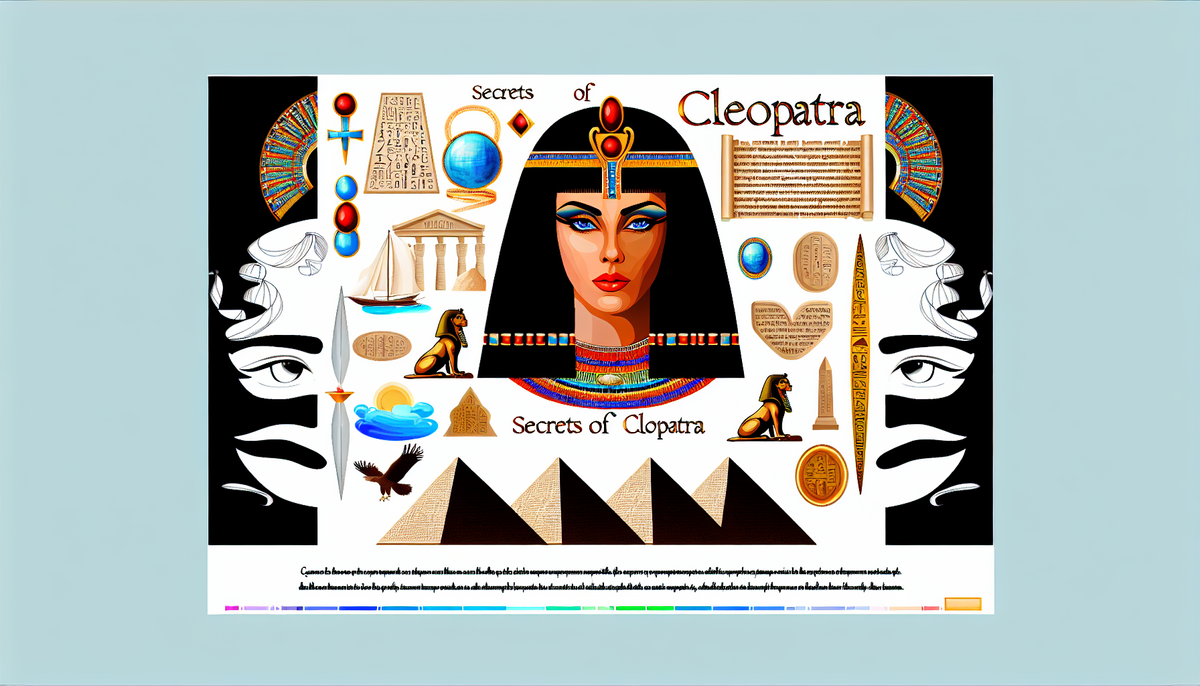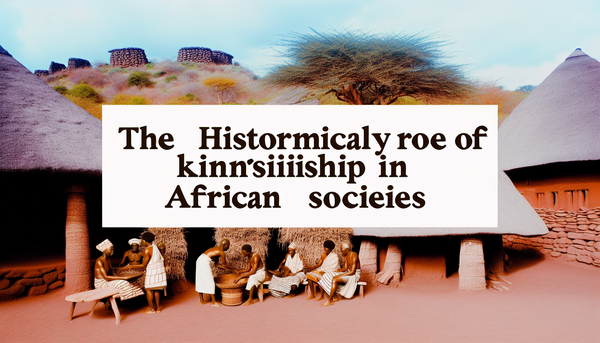Secrets of Cleopatra

Cleopatra's Rise to Power
Cleopatra VII, the last active ruler of the Ptolemaic Kingdom of Egypt, rose to power in a turbulent political landscape. Born in 69 BC, she was the daughter of Ptolemy XII and belonged to a dynasty that had ruled Egypt for nearly three centuries. Following her father's death, Cleopatra faced immediate challenges, including the rivalry with her brother Ptolemy XIII, whom she co-ruled as a minor.
Determined to solidify her position, Cleopatra adopted a strategy of political maneuvering, including an alliance with Julius Caesar. Her infamous meeting with him, reportedly smuggled into his palace wrapped in a carpet, showcased her cunning and charm. This alliance not only provided her with military support to defeat her brother and regain control but also elevated her status in the Roman world.
After Caesar's assassination, Cleopatra aligned herself with Mark Antony, another prominent Roman figure, further solidifying her influence. Their relationship resulted in a formidable partnership that challenged the Roman political establishment. Cleopatra's rise was marked by her ability to navigate complex political alliances and her determination to maintain Egypt's autonomy amid the growing power of Rome. Her reign is a testament to her intelligence, ambition, and the intricate dynamics of power during her time.
Romantic Alliances That Shaped History
Cleopatra's romantic alliances were not merely affairs of the heart; they were strategic moves that significantly impacted the political landscape of her time. Her most notable alliances were with two of Rome's most powerful leaders: Julius Caesar and Mark Antony. Each relationship transformed the trajectory of Egyptian and Roman politics.
Cleopatra's liaison with Julius Caesar began in 48 BC when she sought his support against her brother. Their union was both passionate and politically advantageous, leading to the birth of Caesarion, whom Cleopatra hoped would inherit Egypt's throne. This relationship solidified Cleopatra's power in Egypt while elevating her status in the Roman world, as she became a key player in the dynamics between Rome and its provinces.
After Caesar's assassination, Cleopatra turned to Mark Antony, a general and one of Rome's triumvirs. Their union was marked by both love and political collaboration. Together, they sought to consolidate power against Octavian, leading to military campaigns that ultimately reshaped the Roman Empire. However, their defeat at the Battle of Actium in 31 BC marked the end of their ambitions and initiated a new era in Roman history.
These romantic alliances exemplify how personal relationships can intertwine with political ambitions, shaping the course of civilizations.
Intellectual Prowess and Cultural Impact
Cleopatra VII was renowned not just for her political acumen and beauty, but also for her remarkable intellect and cultural influence. Born into the Ptolemaic dynasty, she was immersed in a world of scholarship and philosophy. Fluent in multiple languages, including Egyptian, Greek, and Latin, Cleopatra was one of the few Ptolemaic rulers to embrace and promote her heritage, bridging the cultural gap between the Hellenistic and Egyptian worlds.
Her intellectual pursuits included studying mathematics, astronomy, and medicine, which she sought to utilize for the betterment of her kingdom. Cleopatra's court became a hub for scholars and thinkers, fostering a vibrant atmosphere of collaboration and innovation. This environment not only enhanced Egypt's cultural standing but also attracted philosophers and artists from across the Mediterranean.
Cleopatra’s approach to governance reflected her understanding of the diverse cultures within her realm. She effectively portrayed herself as the reincarnation of the Egyptian goddess Isis, integrating herself into Egyptian spirituality and thus gaining the support of her subjects. This cultural blending was pivotal, as it allowed her to maintain power and influence over a vast, diverse empire. Cleopatra’s intellectual prowess and cultural impact left a lasting legacy, inspiring countless works of art, literature, and political thought throughout history.
Beauty Secrets and Personal Care Techniques
Cleopatra's reputation as a beauty icon has endured through the ages, fueled by tales of her stunning allure and elaborate beauty routines. Known for her commitment to personal care, the Egyptian queen often employed natural ingredients from her surroundings, showcasing her knowledge of beauty secrets that exemplified both luxury and practicality.
One of her most famous beauty techniques involved the use of milk baths, believed to enhance skin softness and radiance. Cleopatra reportedly bathed in donkey milk mixed with honey and essential oils, an indulgent ritual that left her skin smooth and hydrated. This practice highlighted the use of natural resources to achieve timeless beauty.
Additionally, Cleopatra utilized cosmetics such as kohl, an ancient eye makeup made from a mixture of soot and galena, to enhance her striking features. This not only served as a beauty enhancement but also offered protection against the harsh desert sun and desert dust. Essential oils, fragrant herbs, and floral infusions were commonly employed in her skincare regimen, promoting a sense of well-being and luxury.
Her beauty routines reflected a sophistication that combined practicality with opulence, affecting beauty standards in ancient civilizations and leaving a lasting influence on beauty practices that persists to this day. Cleopatra remains a symbol of the timeless allure of self-care and refinement.
Strategic Political Maneuvers
Cleopatra VII's reign was characterized by astute political strategies that not only preserved her throne but also positioned Egypt as a formidable player in the geopolitical landscape of the ancient world. From the outset, Cleopatra understood that her rule could be challenged, leading her to forge critical alliances with powerful Roman leaders, leveraging both diplomacy and romance.
One of her most significant maneuvers was her alliance with Julius Caesar. After seeking his support against her brother and rival, Ptolemy XIII, Cleopatra orchestrated a plan that involved presenting herself as a co-sovereign and protector of her dynasty. This partnership not only stabilized her power but also resulted in the birth of Caesarion, further entrenching her influence in Rome.
Following Caesar's assassination, Cleopatra allied with Mark Antony, employing both strategic marriage and political advocacy. She skillfully molded Antony’s perception of her as both a lover and a capable ruler, seeking to revive the fortunes of the Ptolemaic dynasty through military campaigns against Rome. However, her reliance on Antony ultimately led to her downfall when they were defeated by Octavian.
Cleopatra's political maneuvers were emblematic of her ability to navigate treacherous waters, showcasing her intelligence in a male-dominated world. Her actions had far-reaching effects, influencing the fate of both Egypt and Rome.
Relationships with Rome's Elite
Cleopatra VII's relationships with Rome's elite were pivotal in shaping her reign and Egypt's geopolitical standing. Understanding the importance of alliance-building, she adeptly navigated the complexities of Roman politics to secure her position as a powerful ruler. Two Roman figures, Julius Caesar and Mark Antony, played central roles in her strategic partnerships.
Cleopatra's affair with Julius Caesar began in 48 BC when she sought his backing against her brother, Ptolemy XIII. By captivating Caesar with her intelligence and charm, she gained not only his support but also established a political alliance that strengthened her position as queen. The birth of their son, Caesarion, symbolized this union, as Cleopatra envisioned a future where her lineage would intertwine with Rome.
Following Caesar's assassination, Cleopatra turned to Mark Antony, a key member of the Roman triumvirate. Their relationship blossomed into a combination of romance and political collaboration, with Cleopatra seeking Antony's military support to expand her influence. Together, they advanced their mutual interests, but their ambitious plans ultimately clashed with Octavian, leading to their downfall.
These relationships exemplified Cleopatra's clever use of romance and diplomacy, demonstrating her ability to leverage personal connections to foster political power in the precarious landscape of Roman politics.
Mysteries Surrounding Her Death
The death of Cleopatra VII remains one of history's most enigmatic events, steeped in intrigue and speculation. Following her defeat alongside Mark Antony at the Battle of Actium in 31 BC and the subsequent siege of Alexandria by Octavian’s forces, Cleopatra faced a grim reality. With her political power crumbling, she sought a way out, leading to a series of dramatic narratives regarding her demise.
The most famous account suggests that Cleopatra died by the bite of an asp, a venomous snake, which she is said to have smuggled into her chambers concealed in a basket of figs. This romanticized version portrays her as choosing a noble death, reclaiming control over her fate rather than submitting to humiliation or forced captivity. However, historians remain divided, with some suggesting that she may have used poison instead, administered through a needle or a drink.
Additionally, questions abound about the motivations behind her death. Was it an act of defiance against Octavian, or was she influenced by the despair of losing her kingdom? Despite various accounts and theories, the exact circumstances surrounding Cleopatra's death remain unclear, cementing her legacy not just as a ruler, but as a figure of enduring fascination and mystery in history.



